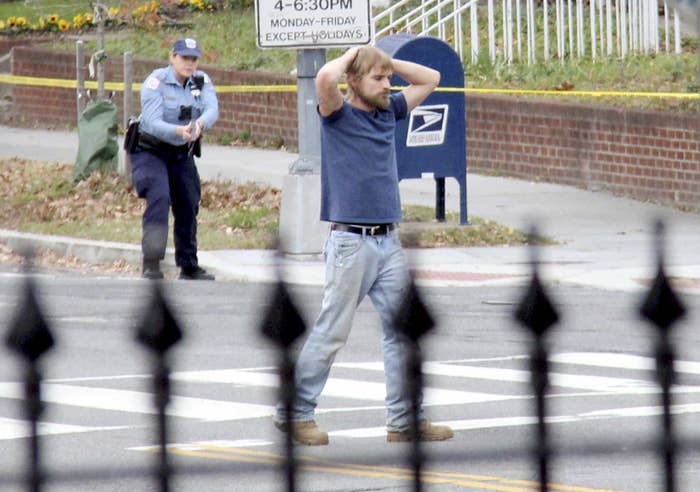
Edgar Maddison Welch, the North Carolina man who brought loaded guns into a DC restaurant to investigate the "Pizzagate" internet conspiracy theory, was sentenced on Thursday to four years in prison.
The sentence was more than the 18 months that Welch's attorney argued for, but slightly less than the 4 and a half years that prosecutors sought.
US District Judge Ketanji Brown Jackson heard emotional testimony at Thursday's sentencing hearing from employees of Comet Ping Pong and the restaurant's owner James Alefantis. Alefantis praised the bravery of his team — employees led customers out to safety after an armed Welch entered the restaurant on a Sunday afternoon in December — and decried the internet conspiracy theorists who had pushed "Pizzagate."
"I do hope that one day, in a more truthful world, every single one of us will remember this day, that day, as an aberration, as a symbol of a time of sickness, when some parts of our world went mad, when news was fake and lies were seen as real and our social fabric frayed," Alefantis told the judge.
Welch briefly spoke at the hearing, saying that he wanted to apologize to anyone affected by his actions but that he also realized "that words cannot undo or change what has already happened." He will receive credit for the time he has already spent in prison, which is close to seven months.
Welch's family declined to speak with reporters after the hearing, as did prosecutors and Welch's attorney, federal public defender Dani Jahn.
Brown cited Alefantis' remarks in announcing the sentence, and said that although she believed that Welch thought he was doing the right thing at the time — the unfounded "Pizzagate" conspiracy theory alleged that Democratic operatives were running a child sex trafficking ring through the restaurant —he had been wrong to take matters into his own hands. She said she was concerned that other people would draw inspiration from what he did, and noted that his actions were not spur of the moment, but rather reflected several days of planning.
"Mr. Welch, I hope you understand and see how much people are suffering as a result of what you did," Brown said.
Comet Ping Pong employees, who did not give their names, spoke to the judge about the psychological trauma they experienced in the aftermath of the incident. One male employee directed his remarks to Welch, saying that he had never physically harmed anyone or turned away from an injustice.
"Shame on you for assuming otherwise," the man said.
On Dec. 4, 2016, Welch drove from his home in North Carolina to Washington, and walked into Comet Ping Pong pizza restaurant carrying a loaded AR-15 assault rifle. He also had a loaded .38 revolver holstered on his hip. He later told police that he had learned about the "Pizzagate" conspiracy theory online.
Patrons fled the restaurant. Welch searched around the restaurant, and when he failed to open a locked door with a butter knife he fired his AR-15 at it, causing damage. An employee who was outside when Welch first walked in heard the gunshots. When the employee came back inside, prosecutors said, Welch pointed the AR-15 at him. The employee fled. No one was injured, and Welch peacefully surrendered to police.
Welch originally faced three weapons charges, including one that carried a mandatory minimum sentence of five years in prison. As part of a plea agreement, prosecutors dropped the charge with the mandatory minimum. The two remaining charges each carried maximum sentences of 10 years in jail, but according to a plea deal, Welch faced estimated sentences ranging from 18–24 months on the first charge and 18–60 months on the second charge.
In court papers filed in the run-up to the sentencing hearing, prosecutors argued that Welch should be sentenced to a total of 54 months — four and a half years — in prison.
Welch "committed serious crimes that terrorized a community and traumatized Comet employees and customers alike. There are victims who require crisis counseling, employees who feel unsafe in their jobs, and children whose memories are imprinted with the danger of that day," Assistant US Attorney Demian Ahn wrote.
Welch's attorney countered that Welch should be sentenced to 18 months in prison, a term that would have fallen at the low end of the sentencing guidelines. She said that Welch had "expressed sincere remorse" for his actions, and was unlikely to reoffend. She also noted that because of security concerns related to the high-profile nature of his case, Welch had been held in solitary confinement for five weeks and subject to 24-hour lockdown, conditions that were "severe, punitive, and deplorable."
"Mr. Welch made an incredibly ill-advised decision to try and save children who he sincerely believed were being held against their will at a popular pizzeria located in Washington, D.C." federal public defender Jahn wrote.
This story will be updated. Check back for additional updates.
